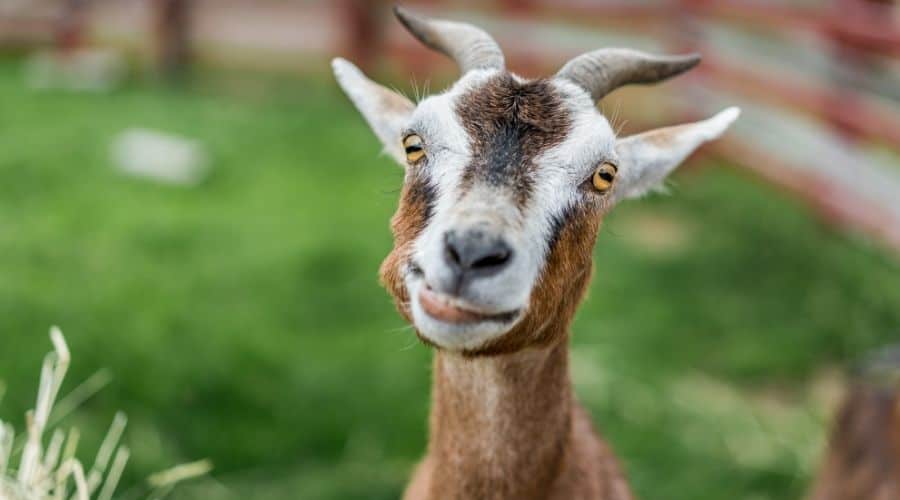Goats use a surprising range of sounds to communicate, including yelling and snorts. While they are better known for their loud, annoying bleats, goats make a host of more subtle sounds like sneezes, and each one has a meaning behind it if you know what to listen for and how to interpret the sound.
A simple snort can indicate half a dozen different things. Why do goats snort?
Goats will snort to communicate something to members of their herd or to people. Snorting can indicate a nervous or startled expression, a doe is in heat, a Flehmen response to scents, or just a reaction to congestion and irritants that got inside the nose.
Table of Contents
What Does It Mean When A Goat Snorts
Interpreting for goats requires a lot of time around them. You’ll need to pay close attention to their body language and what additional cues they give off to truly understand what it means when a goat snorts.
It’s not a simple expression. Snorting can have numerous meanings, from allergies to mating behavior or even nerves.
1 – Nervous
Like most creatures, goats get nervous sometimes. The scent of a predator or something new and unexpected can upset some shy or anxious goats. A snort can help them express their feelings.
2 – Startled or Scared
Lucky goats snort when they’re scared. Even more fortunate goats get to run away. However, a snort on its own would be much more pleasant for many than their involuntary reaction.
As Wonderopolis explains, “Myotonic goats are born with a congenital condition called myotonia congenita, which is also known as Thomsen’s disease. This condition causes their muscles to seize up when they’re startled. This results in their falling over as if they fainted upon being scared.”
If your goat snorts and falls over, it’s probably suffering from this sad, but amusing to watch form of paralysis.
3 – Does In Heat
Some does combine a snort and a vocal wail when they are in heat. While this might not sound like music to human ears, it’s a clear sign to the bucks that they are ready to mate.
As odd as it looks and sounds, this is normal behavior and nothing to be concerned about.
4 – Flehmen Response
Goats also snort as part of their Flehmen response. Like many animals, goats have a unique vomeronasal organ in their snout that helps increase their olfactory sense.
The sensitive tissues are far more powerful tools for picking up scents than humans have. In fact, this high-powered organ can theoretically help animals ‘see’ the world by creating a picture or scent map of their surroundings
To collect scent molecules, a goat will curl its lip. Regrettably, not all smells are pleasant, which leads to snorting, presumably to get rid of a nasty odor.
Though it’s hard to tell how effective this is for pushing scent molecules out of their mouths and noses, it’s probably worth the effort to try since they have such a keen sense of smell.
5 – Nasal Congestion
Goats produce mucus. Sadly that means they are subject to nasal congestion just as a sick or allergy-prone human would be. Whether it’s pollen or a common cold, a congested goat will snort to help clear its breathing passages.
As Backyard Goats points out, “Many goat illnesses begin with telltale signs in a goat’s nose and nasal passage. A runny nose can escalate quickly, turning into an upper respiratory condition or even pneumonia… Nasal discharge can affect one or both nostrils. However, it is not uncommon for a goat’s nasal passage to be blocked as well. A goat with a blocked nasal passage will have a difficult time breathing.”
6 – Irritation
We’ve all had a tickle in our throat or nose at some point. Goats feel that as well. While a human can blow its nose or even pick it, a goat has no such recourse.
If an irritant gets inside their nose, then blowing air or snorting it in are the only real options.
Unfortunately for the goats’ the farms and homesteads, where they are most likely to be found, are full of potential irritants.
Pollen, dust, floating seed pods, and more can all get inhaled by accident. As a result, some snorts are a response to irritation and an attempt to remove something annoying from inside the goat’s snout
7 – Misidentified Sneezes
It’s easy to mistake certain sneezes for snorts. After all, goats make a fake-sneeze sound to warn others of potential danger.
Especially when you’re not looking directly at the goat who made the noise, some sounds are less identifiable. Snorts can also be the precursor to a sneeze, which complicates the issue. It’s worth double-checking.
8 – Nasal Bots
Nasal bots sound like something out of science fiction until you learn what it really is, and then it becomes pure nightmare fuel.
Oestrus ovis flies like to lay their eggs on a goat’s nose, which wouldn’t be so bad on its own. When the eggs hatch, the larvae of these flies make their way along the goat’s snout and into its nasal cavity.
They work their way into the goat’s sinuses, where they can cause infections. Inflammation will cause mucous discharge and lots of sneezing.
Eventually, the goat sneezes and snorts all the mature flies out, repeating the cycle. This is disgusting and can cause serious ill health for your goats.
Helpful Tips To Know About Why Goats Snort
Excited, afraid, curious, or irritated, goats have numerous different snorts to convey how they feel about things. If your goat snorts at you, pay attention to their body language and what’s going on to decipher what it means more easily.
Here are a few more helpful tips to know about why goats snort.
- Unlike humans, goats do not snort to express disgust or distaste. Their rude attitude is really just a loud personality with excellent communication skills.
- Sometimes, when bucks feel territorial, they use a snort as a warning sound for other goats. It’s a common misconception that headbutting is always about dominance, but it’s not. Simple sounds can replace a long, drawn-out headbutting match. Additionally, goats of all ages and genders participate in headbutting socially. The warning snort can tip you off when it’s a ‘real’ fight.
- A snort is just a snort sometimes. If your goat is digging around, exploring the yard for tasty morsels, they may snort. Using your nose for everyday activities can result in snorting for most species, including goats.
Final Thoughts
Most goat snorts are an indication of emotional responses. However, some snorts are a result of sickness or sinus irritation, so it’s vital to pay attention to how your animals are communicating.
A one-off snort is probably goat-speak for something. Alternately, repeated snorting should always get more than a cursory glance.
You’ll soon learn to spot the difference between a doe in heat, or a Flehmen response, a scared goat, and one who might need to see a vet about his allergies.

